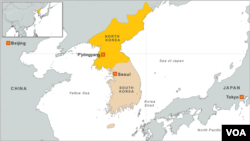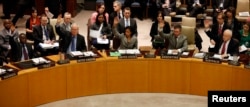NEW YORK —
President Obama’s National Security Advisor Tom Donilon said Monday the United States refuses to reward what he called “bad behavior by North Korea,” and announced the imposition of U.S. sanctions against North Korea’s primary foreign exchange bank.
Donilon said the United States has made clear it is open to authentic negotiations with North Korea, but has only seen provocations and extreme rhetoric in return. Unless North Korea changes its course, the White House advisor added, the United States will continue to work with allies and partners to tighten national and international sanctions to impede North Korea’s nuclear and missile programs.
“Today, in fact, the Treasury Department is announcing the imposition of U.S. sanctions against the Foreign Trade Bank of North Korea, the country’s primary foreign exchange bank, for its role in supporting North Korea’s weapons of mass destruction program," he said.
"By now it is clear that the provocations, escalations and poor choices of North Korea’s leaders are not only making their country less secure - they are condemning their people to a level of poverty that stands in stark contrast not only to South Korea, but every other country in East Asia,” Donilon added.
Last week, the United Nations Security Council adopted a resolution strengthening sanctions against North Korea, action labeled an act of war by North Korea. Adoption of the U.N. resolution followed North Korea’s third nuclear test, which violated previous U.N. resolutions.
In a statement on the sanctions against North Korea’s Foreign Trade Bank, the U.S. Treasury Department says it is targeting what it describes as a key financial node in North Korea’s weapons of mass destruction apparatus and cutting it off from the U.S. financial system.
In a speech to the Asia Society, a private educational organization, Obama advisor Donilon reviewed what the White House has described as a rebalancing of U.S. power toward Asia. He said the U.S. commitment to the Asia-Pacific region will not be affected by financial pressures and defense budget reductions. Turning to U.S. relations with China, Donilon said the two countries have made substantial progress in building a constructive relationship over the past four years. He called for a deeper military-to-military dialogue between the United States and China.
“It remains a necessary component of the model we seek and is a critical deficiency in our current relationship," said Donilon. "The military-to-military relationship between the United States and China lags behind the economic and political and diplomatic relationship that we have, and it needs to be corrected. You can’t have a comprehensive, positive relationship and not have the kind of military-to-military deep dialogue that is necessary.”
Donilon also urged China to take serious steps to investigate and put a stop to cyber-enabled theft, and to engage with the U.S. in what he termed a constructive direct dialogue to establish acceptable norms of behavior in cyberspace.
Donilon said the United States has made clear it is open to authentic negotiations with North Korea, but has only seen provocations and extreme rhetoric in return. Unless North Korea changes its course, the White House advisor added, the United States will continue to work with allies and partners to tighten national and international sanctions to impede North Korea’s nuclear and missile programs.
“Today, in fact, the Treasury Department is announcing the imposition of U.S. sanctions against the Foreign Trade Bank of North Korea, the country’s primary foreign exchange bank, for its role in supporting North Korea’s weapons of mass destruction program," he said.
"By now it is clear that the provocations, escalations and poor choices of North Korea’s leaders are not only making their country less secure - they are condemning their people to a level of poverty that stands in stark contrast not only to South Korea, but every other country in East Asia,” Donilon added.
Last week, the United Nations Security Council adopted a resolution strengthening sanctions against North Korea, action labeled an act of war by North Korea. Adoption of the U.N. resolution followed North Korea’s third nuclear test, which violated previous U.N. resolutions.
In a statement on the sanctions against North Korea’s Foreign Trade Bank, the U.S. Treasury Department says it is targeting what it describes as a key financial node in North Korea’s weapons of mass destruction apparatus and cutting it off from the U.S. financial system.
UN Security Council Resolution 2094
UN Security Council Resolution 2094- Condemns in strongest terms North Korea's ongoing nuclear activities
- Imposes new financial sanctions to block transactions in support of illicit activities
- Strengthens states' authority to inspect cargo, deny port, overflight access
- Enables stronger enforcement of sanctions by U.N. member states
- Imposes sanctions on new individuals and entities
“It remains a necessary component of the model we seek and is a critical deficiency in our current relationship," said Donilon. "The military-to-military relationship between the United States and China lags behind the economic and political and diplomatic relationship that we have, and it needs to be corrected. You can’t have a comprehensive, positive relationship and not have the kind of military-to-military deep dialogue that is necessary.”
Donilon also urged China to take serious steps to investigate and put a stop to cyber-enabled theft, and to engage with the U.S. in what he termed a constructive direct dialogue to establish acceptable norms of behavior in cyberspace.





